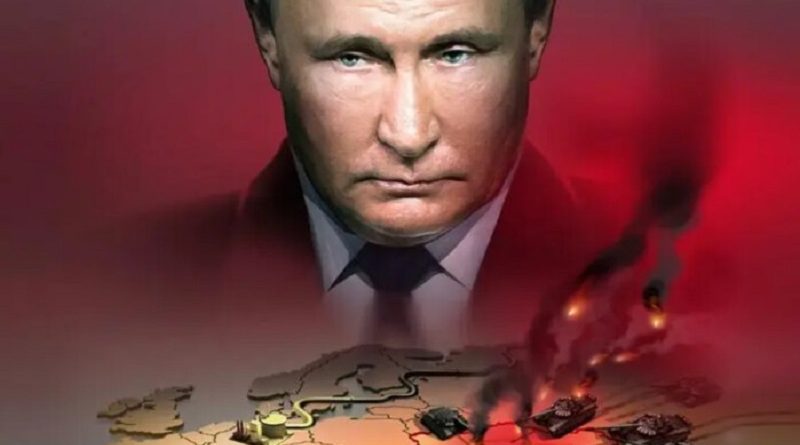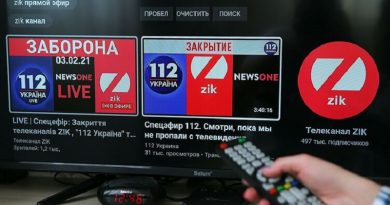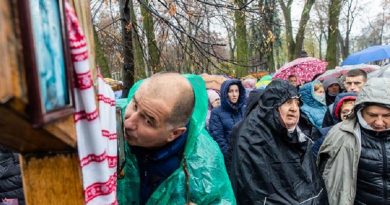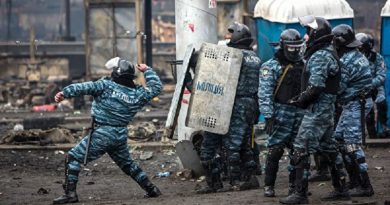The “Victims of Tyranny” Narrative and the Silence about Russia’s War on Ukraine
At the beginning of Russia’s full-scale invasion of Ukraine, there were a few attempts in Russia to publicly protest against the war. The Kremlin regime suppressed these overt efforts by crushing the protests and criminalizing the most persistent disobedient protesters.
Some Russians continue to express their political position that deviates from the Kremlin propaganda. Their main goal is to liberate Russia from the current “criminal regime” of Vladimir Putin and his cronies. But, according to Lev Gudkov, Russian sociologist and director of the Levada Center, there is little compassion toward the suffering of Ukrainians inflicted by Russia: “The Russians have little compassion for the Ukrainians. Almost no one here talks about the fact that people are being killed in Ukraine.”
Today, after numerous barbaric air and drone strikes conducted by Russia against Ukraine, deportations of Ukrainian children and adults from Ukraine to Russia-controlled territories, and crimes against humanity committed by Russian soldiers in Ukraine, the public support of the war remains broad in Russia. As researchers point out, this support is also shallow. However, the current fragility has little to do with compassion toward the Ukrainians. The public discontent is primarily fueled by the economic pains and ongoing mobilization, which is conducted in many cases covertly, and the implementation of various travel restrictions impacting those who can be conscripted and mobilized. Apparently, this war is a sheer inconvenience to the comfort of the Russian civilians’ daily lives.
A majority of speakers from Russia are good at explaining how the current Russian society became a hostage of the Kremlin regime. Yet, why Russia launched its war in 2014 by occupying Crimea and parts of Donbas and why many Russians continue to see the Ukrainians as part of the “Russian World” (russkiy mir) have been generally ignored. When pursuing changes in Russia, anti-Putin Russian liberals will have to invest their endeavors into understanding Ukraine as a sovereign state and stop seeing it as a territory of Russia’s former influence. Moreover, they will also have to learn how to deliver Ukraine’s political and cultural distinctiveness to the Russian population that has been brainwashed with the perennial idea about the Russians and the Ukrainians being “one people.”
Regarding the 2014 Crimea occupation, Alexei Navalny recognized that Russia violated a number of international laws but he also made it clear that Crimea would remain part of Russia: “Crimea is what, a sausage sandwich?” (Navalny changed his problematic rhetoric about the borders only after Russia’s full-scale invasion in 2022.) As the 2014 polls showed, Russian President Vladimir Putin re-established his status as a strong leader after the occupation of Crimea. He became “a national hero” of contemporary Russia. The persistent reluctance to deter the initial invasion of Ukraine in 2014, not only in Russia but in the West as well, has invigorated the Kremlin’s plans to further invade Ukraine in 2022.
Thousands of Russians, including prominent intellectuals and artists, left the country after February 24, 2022, and many obtained fellowships and opportunities for potentially robust activism against Russia’s war on Ukraine. Events organized by Russians abroad and supported by various institutions condemn the Putin regime but they often avoid making clear statements about Russia’s responsibility to respect Ukraine’s sovereignty.
Ekaterina Schulmann, a Russian political scientist, who wrote about opposition to the war, received a fellowship in Germany and left Russia after the full-scale invasion of Ukraine. When referring to Russia’s assault on Ukraine during her interview in Paris, Ekaterina Schulmann inserted in her response the euphemistic “special military operation,” explaining that this is the official term for Russia’s war on Ukraine used by the Russian government. This rhetoric signalizes a missed opportunity to reach broader audiences in Russia. The interview, conducted in English, was provided with Russian subtitles and posted on Schulmann’s YouTube channel, which has over a million subscribers. Despite her “foreign agent” status in Russia, Ekaterina Schulmann can still publish her works, although she is subject to restrictions and additional audits.
On June 6, 2023, Russia blew up the Kakhovka Hydroelectric Power Plant dam changing the geography of the impacted areas and causing a large-scale catastrophe whose long-term consequences for the ecosystem are hard to evaluate at the moment. Ekaterina Schulmann provided her commentary in a program posted on her YouTube channel. She insinuated that what happened at the dam and what eventually caused the collapse was not clear. Nothing was mentioned about the number of Ukrainians impacted by the disaster. Not a word was mentioned about the destruction of flora and fauna. Russia also did not organize evacuation from the impacted areas leaving people behind and dooming animals to death. Moreover, Russian troops continued shelling while the civilians were trying to leave the flooded areas. None of this was pointed out in Schulmann’s report.
Because Russia considers occupied parts of Kherson Oblast “Russian territory” today, Schulmann’s commentary again played into the hands of the Kremlin propaganda and encouraged the integration of Russia-occupied territories into the media space of Russia. This public silence about Russia’s destruction of Ukraine and Ukrainians demonstrates not only Russians’ obedience toward the regime but also indifference toward violence, aggression, and death.
Schulmann made a few comments about the Russian draftees killed in Belgorod Oblast but no information was provided about the number of Ukrainians that suffer from Russia’s ongoing assault. In this one-sided rhetoric, perpetrators are turned into victims. Such flawed rhetoric means utter complicity in the Putin regime.
As the war continues, Russian anti-war initiatives have embraced the narrative of “victims of tyranny” that weakens the political stance of resistance and strengthens the stance of self-victimization.
The “victims of tyranny” narrative receives much sympathy among Western audiences, and Russia uses it today to its own good advantage. But this strategic tactic shows not only Russia’s longstanding manipulation of information but also a lack of knowledge about the region which the West still endures.
The “victims of tyranny” triggers the memory of Stalinism and the GULAG system which shaped the Western perception of Russian dissidents—the memory of dissidents residing in various Soviet republics has been obfuscated or entirely dismissed. It is often omitted that many non-Russian nationalities were victims of Stalin’s repressions and executions. At least 4 million Ukrainians died as a result of the Holodomor organized by Stalin and his supporters. Millions of representatives of various ethnicities and nationalities suffered from the atrocities of WWII. Still, these numbers are befogged in the Western collective memory which continues to gear toward the conflation of Russia and the Soviet Union, and as a result, of Russians and the Soviets. The term “Soviets” is barely mentioned outside the professional discussions of academics, and as such, their losses in WWII sadly have often been presented as the losses of “Russians.”
The rhetoric of “victims of tyranny” today can probably help international audiences to better understand why the current Russian society in its overwhelming majority is silent about Russia’s war on Ukraine but it does not help to comprehend the scope of atrocities from which the Ukrainians suffer daily: ongoing air and drone strikes, destruction of infrastructure, illegal resettlements and deportations of children and adults, mass rape and killings in the occupied areas, and long-term consequences of the largest war in Europe since WWII.
Myroslav Marynovych, a Ukrainian dissident, once mentioned that the Ukrainian and Russian dissidents had political agendas that overlapped: they fought against the Soviet regime. But he also emphasized that Ukrainian political prisoners pursued the political independence of Ukraine, which was not part of their Russian counterparts’ struggles.
The Putin regime has been feeding off of Russia’s imperial past for over two decades. The current Russian narrative of “victims of tyranny” must be dismissed. Russia must undergo the process of de-imperialization on all levels: governmental, individual, cultural, educational, etc. Otherwise, no profound changes will take place in Russia in the foreseeable future.
The Author: Nataliya Shpylova-Saeed
(a Ph.D. in Slavic languages and literatures (Indiana University, 2022); a Ph.D. in American literature (Taras Shevchenko Institute of Literature, National Academy of Sciences of Ukraine, 2007). Research interests include contested memory, with a focus on Ukraine and Russia. A review editor of H-Ukraine. Since 2016, a host on the New Books Network (Ukrainian Studies, East European Studies, and Literary Studies channels). During 2022-2023, a visiting assistant professor in the Department of Russian and Eurasian Studies Program at Colgate University (Hamilton, NY). Joins the Slavic Department at Harvard University as a Preceptor of Ukrainian).
Photo from open sources
The Ally of Executioners: Pushkin, Brodsky, and the Deep Roots of Russian Chauvinism
Is Russian Culture Responsible for “Putin’s war” in Ukraine?
Flirting with the Abyss: Russia’s Barbaric War and Crimes Against Humanity




